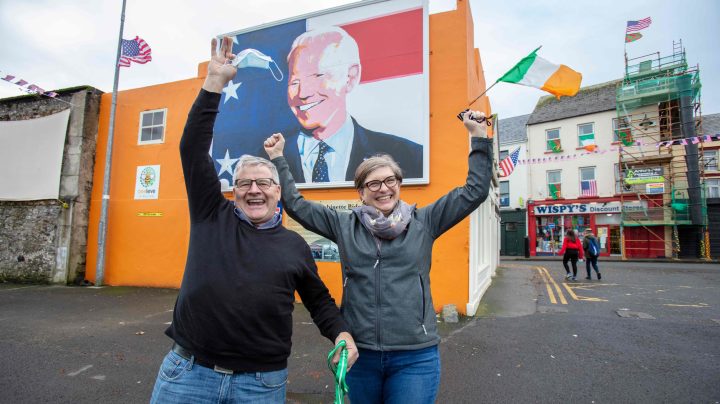
How Biden’s roots and Riverdance play a role in Irish diplomacy
How Biden’s roots and Riverdance play a role in Irish diplomacy

For a country of almost 5 million people, Ireland demonstrates considerable influence in business and politics. Its finance minister is the current president of the Eurogroup. It has recently taken up one of the temporary, rotating seats on the U.N. Security Council for the next two years.
In the United States, the taoiseach (the prime minister of Ireland), is invited to the White House on St. Patrick’s Day, an annual honor not offered to many other countries. Ireland’s Micheál Martin is keen to meet with President Joe Biden this year for the shamrock ceremony to encourage closer ties between the two countries.
It’s about “soft power,” said Tony Foley, an emeritus associate professor in economics at Dublin City University. “When an entity, organization, individual or country is operating above its weight on objective criteria like size, wealth, that transcends the obvious economic and measurable value.”
Recently, it was evident in Ireland’s efforts to win that aforementioned spot on the U.N. Security Council. It arranged tickets to U2 gigs around the world, a sing-song for ambassadors in a county Cork pub and even seats at Riverdance on Broadway as part of its bid for the seat. Canadian diplomats, meanwhile, whom Ireland was competing against, offered gifts like Celine Dion tickets.
Much of Ireland’s so-called soft power can be traced back to mass emigration during the potato famine in the 1840s. At that time, millions left the country fleeing poverty and starvation. That sowed the seeds for a global network of Irish connections.
“At the moment, in the United States, about 35 million people identify themselves as of Irish descent,” Foley said.
And among them is President Biden. Even before his inauguration, he frequently talked about his family heritage in the west of Ireland. It was even a factor when it came to choosing his nominee for labor secretary.
“I nominate a good friend and a stand-up guy, Marty Walsh of Boston, son of Irish immigrants,” he said. “His only downside — they’re not from Mayo, they’re from Galway.”
Even half a world away, sporting rivalries between neighboring Irish counties live on.

The economic impact of emigration is especially noticeable in levels of foreign direct investment and, before the pandemic, in the number of tourists visiting Ireland. In the United States, people with Irish roots form an informal marketing campaign, which yields dividends.
It’s a soft power approach which contributes to nearly 10 million people making the journey to Ireland each year, Foley said.
“About 6 million [come] from areas other than the United Kingdom,” he said. “Obviously, if they have a satisfactory experience, they build up a pleasant image of Ireland. Of course, over several years, that’s bigger and bigger numbers [of people] with a positive attitude.”
And it’s not just tourism. High-profile companies like Facebook, Twitter and Google have set up their European headquarters in Dublin. The city boasts a skilled and educated workforce. It also offers a 12.5% corporate tax rate, one of the lowest in the European Union. That’s not always popular with its neighbors in Europe who say it gives Ireland an unfair advantage. Successive governments have defended the rate.
It’s the international city of Dublin and a keen workforce across the country which business leaders want to promote each year when they fly out ahead of the St. Patrick’s Day celebrations each year.
So much so, it was “the very last physical trip” that business leader Danny McCoy made in 2020. He departed from Washington, D.C., as coronavirus restrictions were being implemented around the U.S. capital.
McCoy, who is CEO of IBEC, the Irish Business and Employers Confederation, is confident that he can maintain relationships even at a distance. Doing business in Ireland makes financial sense, he said.
“Very few places on earth will have experienced a 100% increase in their GDP in six years,” he said of Ireland. “And even during COVID, when you look at the presence of U.S. foreign direct investment servicing both Europe and the Middle East, we’re probably going to see a situation where the Irish economy, in GDP terms, won’t have actually declined in 2020, despite COVID.”
McCoy is optimistic the Biden administration will take a more collaborative approach to international trade, something he hopes Ireland can be a part of too, even if only with a virtual pint for now.
There’s a lot happening in the world. Through it all, Marketplace is here for you.
You rely on Marketplace to break down the world’s events and tell you how it affects you in a fact-based, approachable way. We rely on your financial support to keep making that possible.
Your donation today powers the independent journalism that you rely on. For just $5/month, you can help sustain Marketplace so we can keep reporting on the things that matter to you.











